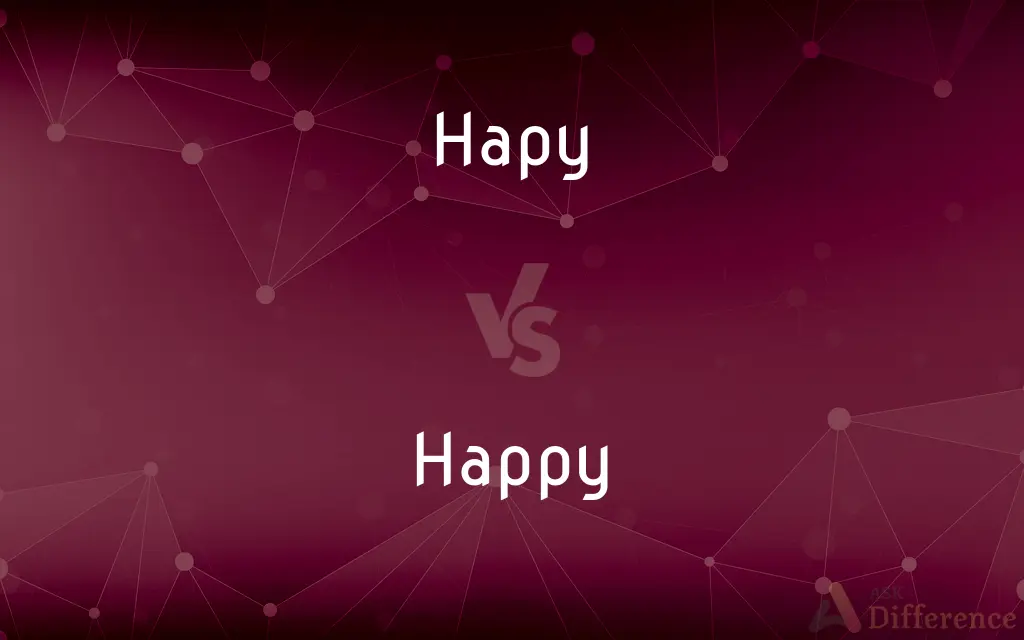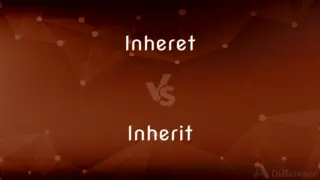Hapy vs. Happy — Which is Correct Spelling?
By Tayyaba Rehman & Fiza Rafique — Updated on April 1, 2024
Incorrectly spelled as "Hapy," the correct spelling is "Happy," which means experiencing pleasure, joy, or contentment.

Table of Contents
Which is correct: Hapy or Happy
How to spell Happy?

Hapy
Incorrect Spelling

Happy
Correct Spelling
ADVERTISEMENT
Key Differences
Associate "Happy" with "puppy," both having double 'p's.
Use a mnemonic: "People Are Pleased, Yes" to remember the double 'p' in "Happy."
Visualize "Happy" as having more, an extra 'p', compared to the lacking "Hapy."
Remember "Happy" has a pair of 'p's, just like the double pleasure in happiness.
Think of "Happy" as a full smile needing two 'p's, unlike the incomplete "Hapy."
ADVERTISEMENT
How Do You Spell Happy Correctly?
Incorrect: She was hapy to see her friend after a long time.
Correct: She was happy to see her friend after a long time.
Incorrect: The news made him very hapy.
Correct: The news made him very happy.
Incorrect: I feel so hapy today because I passed my exam.
Correct: I feel so happy today because I passed my exam.
Incorrect: We had a very hapy time at the amusement park.
Correct: We had a very happy time at the amusement park.
Incorrect: Hapy birthday to you!
Correct: Happy birthday to you!
Happy Definitions
Happy signifies being contented and satisfied in life.
They lived a simple but happy life.
Happy refers to showing joy or cheerfulness.
His happy demeanor was contagious.
Enjoying, showing, or marked by pleasure, satisfaction, or joy
A happy child.
The happiest day of my life.
Cheerful; willing
Happy to help.
Characterized by good luck
A happy sequence of events.
Being especially well-adapted; felicitous
A happy turn of phrase.
Characterized by a spontaneous or obsessive inclination to use something. Often used in combination
Trigger-happy.
Enthusiastic about or involved with to a disproportionate degree. Often used in combination
Money-happy.
Clothes-happy.
Having a feeling arising from a consciousness of well-being or of enjoyment; enjoying good of any kind, such as comfort, peace, or tranquillity; blissful, contented, joyous.
Music makes me feel happy.
Experiencing the effect of favourable fortune; favored by fortune or luck; fortunate, lucky, propitious.
Content, willing, satisfied (with or to do something); having no objection (to something).
Are you happy to pay me back by the end of the week?
Yes, I am happy with the decision.
(Of acts, speech, etc.) Appropriate, apt, felicitous.
A happy coincidence
(in combination) Favoring or inclined to use.
Slaphappy, trigger-happy
Dexterous, ready, skilful.
Implying 'May you have a happy ~' or similar; used in phrases to wish someone happiness or good fortune at the time of a festival, celebration, or other event or activity.
Happy birthday!, Happy Fourth of July!, Happy anniversary!, Happy job-hunting!
A happy event, thing, person, etc.
Often followed by up: to become happy; to brighten up, to cheer up.
Often followed by up: to make happy; to brighten, to cheer, to enliven.
Favored by hap, luck, or fortune; lucky; fortunate; successful; prosperous; satisfying desire; as, a happy expedient; a happy effort; a happy venture; a happy omen.
Chymists have been more happy in finding experiments than the causes of them.
Experiencing the effect of favorable fortune; having the feeling arising from the consciousness of well-being or of enjoyment; enjoying good of any kind, as peace, tranquillity, comfort; contented; joyous; as, happy hours, happy thoughts.
Happy is that people, whose God is the Lord.
The learned is happy Nature to explore,The fool is happy that he knows no more.
Dexterous; ready; apt; felicitous.
One gentleman is happy at a reply, another excels in a in a rejoinder.
Enjoying or showing or marked by joy or pleasure or good fortune;
A happy smile
Spent many happy days on the beach
A happy marriage
Experiencing pleasure or joy;
Happy you are here
Pleased with the good news
Marked by good fortune;
A felicitous life
A happy outcome
Satisfied; enjoying well-being and contentment;
Felt content with her lot
Quite happy to let things go on as they are
Exaggerated feeling of well-being or elation
Well expressed and to the point;
A happy turn of phrase
A few well-chosen words
A felicitous comment
Happy describes a feeling of pleasure or contentment.
She was happy at the news.
Happy can mean fortunate or apt.
It was a happy coincidence.
Happy is used to describe expressions of joy.
Her happy laughter filled the room.
Happy Meaning in a Sentence
The happy ending of the movie made everyone in the theater smile.
She felt happy after receiving good news from her family.
I'm happy to help you with your homework.
I'm always happy to spend time with my best friend.
The children were happy to play outside on a sunny day.
The happy dog wagged its tail when it saw its owner.
The happy couple celebrated their anniversary with a special dinner.
He was happy to find out he had won the first prize in the competition.
My parents are always happy when I bring good grades home.
We were happy to hear that we would be going on a field trip next week.
I feel happy when I see my plants growing well.
She was happy to receive a letter from her pen pal.
Finding a lost toy made the little boy very happy.
She felt happy every time she painted a beautiful landscape.
Seeing the happy faces of my family during the holidays is the best gift.
He was happy to take on the challenge of learning a new language.
The happy melody of the song made her dance.
Being able to read my favorite book makes me happy.
I'm happy to see you making new friends at school.
The team was happy to win the championship after months of hard work.
It makes me happy to see people helping each other.
They were happy to have finished the project on time.
The happy laughter of children filled the park.
The happy chef shared his secret recipe with the audience.
Happy Idioms & Phrases
Happy go lucky
To have a carefree and cheerful attitude.
He's a happy-go-lucky guy who's always in a good mood.
Happy as a clam
To be very happy and content.
She's been as happy as a clam ever since she moved to the countryside.
Common Curiosities
What is the root word of Happy?
The root word of Happy is "hap," which means luck or chance.
What is the pronunciation of Happy?
Happy is pronounced as /ˈhæp.i/.
Why is it called Happy?
It is called Happy because it denotes a feeling of joy, contentment, or pleasure.
What is the verb form of Happy?
There is no direct verb form of Happy; the related verb is "to make happy" or "to gladden."
Which vowel is used before Happy?
The vowel 'a' is used before the 'pp' in Happy.
What is the singular form of Happy?
The singular form is Happy.
Which preposition is used with Happy?
Prepositions like "about," "with," or "for" are used, as in "happy about the results."
Is Happy a negative or positive word?
Happy is a positive word.
What is the plural form of Happy?
Happy does not have a plural form as it is an adjective.
Which conjunction is used with Happy?
Conjunctions like "and" or "but" can be used, as in "happy but tired."
Is Happy a noun or adjective?
Happy is an adjective.
Is Happy an adverb?
No, Happy is not an adverb.
Is the Happy term a metaphor?
It can be used metaphorically to describe feelings or states.
Is the word Happy Gerund?
No, Happy is not a gerund.
How many syllables are in Happy?
There are two syllables in Happy.
What is a stressed syllable in Happy?
The stressed syllable in Happy is "Hap-."
Is Happy a collective noun?
No, it is not a collective noun.
Is the word Happy imperative?
No, Happy is not used in the imperative form as it is an adjective.
How do we divide Happy into syllables?
Happy is divided as Hap-py.
What part of speech is Happy?
Happy is an adjective.
Which article is used with Happy?
The indefinite article "a" or the definite article "the" can be used, as in "a happy moment" or "the happy couple."
Is Happy an abstract noun?
No, it is an adjective; "happiness" would be the abstract noun form.
Is Happy a countable noun?
No, it's an adjective, not a noun, and therefore not countable.
Is Happy a vowel or consonant?
Happy is neither; it's an adjective. The word contains vowels and consonants.
Is the word “Happy” a Direct object or an Indirect object?
Being an adjective, Happy is neither a direct nor an indirect object.
What is another term for Happy?
Another term for Happy is "joyful" or "content."
What is the opposite of Happy?
The opposite of Happy is "sad" or "unhappy."
Share Your Discovery

Previous Comparison
Medle vs. Meddle
Next Comparison
Inheret vs. InheritAuthor Spotlight
Written by
Tayyaba RehmanTayyaba Rehman is a distinguished writer, currently serving as a primary contributor to askdifference.com. As a researcher in semantics and etymology, Tayyaba's passion for the complexity of languages and their distinctions has found a perfect home on the platform. Tayyaba delves into the intricacies of language, distinguishing between commonly confused words and phrases, thereby providing clarity for readers worldwide.
Co-written by
Fiza RafiqueFiza Rafique is a skilled content writer at AskDifference.com, where she meticulously refines and enhances written pieces. Drawing from her vast editorial expertise, Fiza ensures clarity, accuracy, and precision in every article. Passionate about language, she continually seeks to elevate the quality of content for readers worldwide.


































